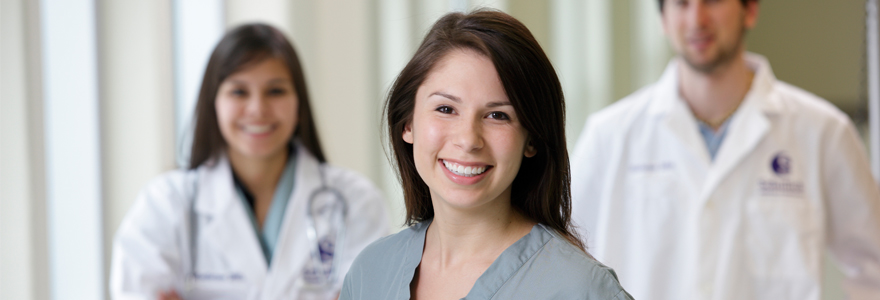Service Learning

The mandate for Service Learning at Schulich Medicine & Dentistry is to unite academic study and community service in mutually reciprocal ways. We strongly believe that through the journey as a medical student, it is vital that there is socialization through a community of practice that includes exposure to both medical knowledge and social interaction. This service learning experience has exposed our students to a community which will foster their learning in four key domains: reflection, self and other awareness, engagement and systems knowledge.
Since the last accreditation site visit the Doctor of Medicine (MD) program has formally integrated mandatory service learning into its curriculum. The service learning curriculum is designed to complement the philanthropic and volunteer activities that afford opportunities for service that have historically been a significant feature of student culture at Schulich School of Medicine & Dentistry.
Service learning is a mandatory component of the MD program curriculum, initially introduced during the 2015-16 academic year, as part of the Year 1 Population Health course.
The Service Learning curriculum was designed to expose our students to communities, through involvement in a community organization or group, in order to foster their learning in four key domains: reflection, self and other awareness, engagement and systems knowledge.
Students were required to complete by the end of the academic year, a minimum of 14 hours of service learning, in a non-medical capacity with a community placement of their choosing.
Students were encouraged to choose a community placement that resonated with their own values or interests or those with which they had already established a connection either through personal or school-related service or philanthropic activities. At the end of the year, there were approximately 160 different community placements (total for London and Windsor campus students).
As an assessment requirement, students were required to:
- Describe their community organization and the partnership it has with the community;
- Outline their learning objectives for their placement; and,
- Write two reflections about their service learning experiences.
This reflective writing exercise gave students the opportunity to reflect on their experience, providing an opportunity to share any memorable experiences, and to think critically about how their objectives had been met.
The service learning curriculum has since evolved and has been integrated into a new Year 1 course, Social Medicine, for the 2016-17 academic year.
Social Medicine is a year-long course which focuses upon exploring social and structural components of patient care. By incorporating service learning within Social Medicine students are provided with better context for their service learning activities and engage in a more meaningful community experience.
For 2016-17 students must complete a minimum of 18 hours in a community placement. Service learning may involve teaching, health care advising, community development, environmental projects, and a host of other activities that contribute to the well-being of the individuals in the communities served. As an example of a service learning activity, one group has chosen to focus on the refugee population in London, Ontario, through a placement with the Cross Cultural Learner Centre.
A core curricular and assessment requirement of Social Medicine is that learners work as a group on a year-long project exploring a chosen Demographic Population. Students have chosen their service learning activities depending on their demographic population examined for their project so that they can meaningfully explore the social determinants of health. This project’s focus is to recognize and respond to the social factors that are at the root of patients’ risks for, response to, and experience with, disease.
Organizations where students may complete their service learning, include, but are not limited to:
- The Salvation Army
- The Downtown Mission (London and Windsor)
- Regional HIV/AIDS Connection
- Big Brothers and Big Sisters of London and Area
- Goodwill Industries
- The Boy’s and Girl’s Club
- Alzheimer society of London
- The Ark Aid Street Mission
- Camp Trillium
- Canadian Cancer Society
- Habitat for Humanity
- Independent Living Centre
- Mission Services of London and Windsor
- Autism Ontario
- John’s Ambulance
- Joseph’s Hospice
- Unemployed Help Centre
- ReForest London
- Canadian Mental Health Association
- Windsor-Essex County Branch
- Chatham Kent Health Alliance
- Special Olympics Swimming, London
- My Sister’s Place, London
- Youth Opportunities, London
Students must complete several primary components as part of their project:
- A report identifying: (a) why they have chosen their particular demographic population; (b) what the group perceives as obstacles for their population to achieve optimal health care outcomes; and, (c) the group’s plans to participate in a service learning opportunity;
- An evidence-based report on the obstacles to achieve optimal health care outcomes for their demographic group to include 5-6 articles, and a discussion on how the obstacles serve as an indicator for challenges in clinical practice;
- A tool kit with: (a) possible solutions to overcome health obstacles for their demographic group; (b) a discussion of how perceived notions differ from research and experiences; (c) a reflection on their service learning experience; and, (d) an outline on how the information will be presented on project day; and,
- A presentation on Project Day of findings and sharing their service learning experience to classmates.
The Schulich School of Medicine & Dentistry actively supports and encourages student participation in philanthropy, including voluntary service-learning and community service. In addition to mandatory curricular Service Learning activities, medical students are afforded opportunities for, and encouraged to participate in a number of volunteer and philanthropic activities that allow them to learn through service.
These activities are coordinated by the Hippocratic Council and supported by the School and provide an opportunity for students at either campus to engage with the communities in which their learning is embedded.









